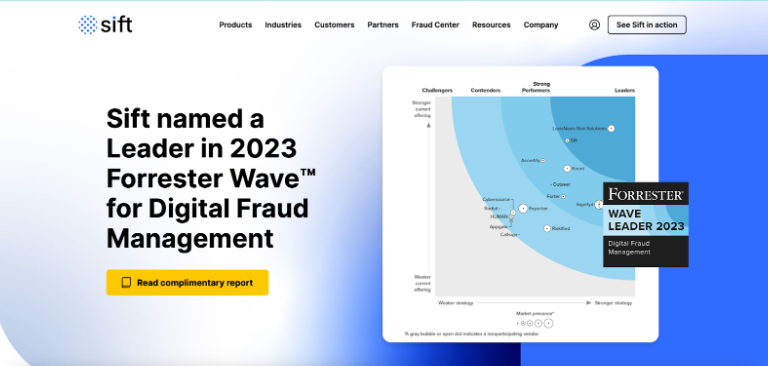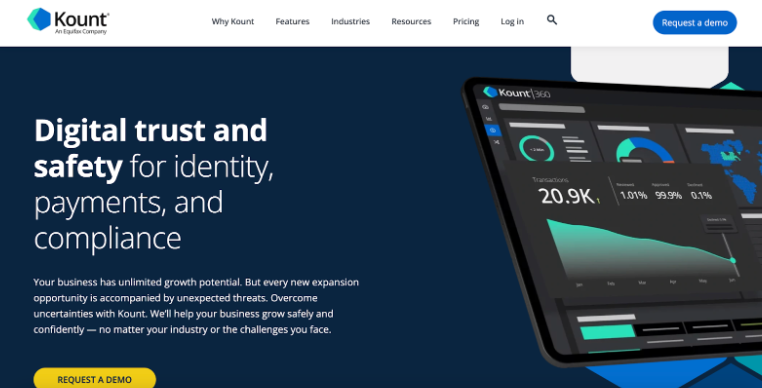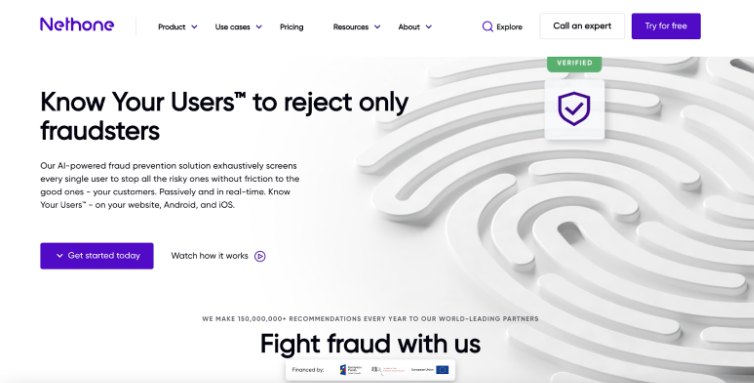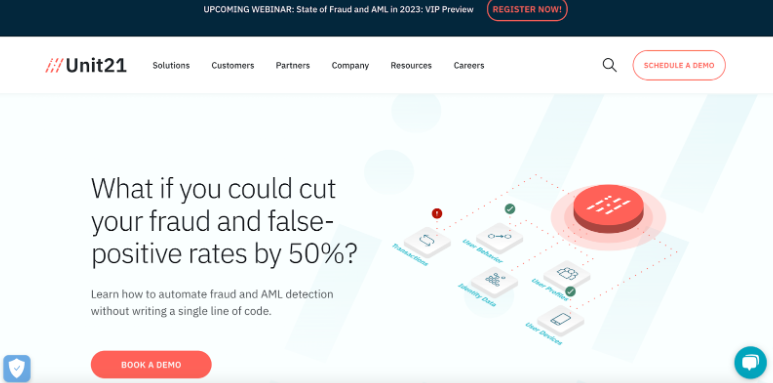12 Best Ecommerce Fraud Prevention Software for B2B Business

Ecommerce fraud prevention software serves as an essential safeguard for online businesses, given the complexity and inherent risks of the digital marketplace. While the internet offers numerous opportunities for business expansion, it also exposes companies to new threats. In 2022, global losses due to payment fraud in ecommerce were estimated at approximately $41 billion, a figure expected to increase to $48 billion in 2023.
These fraud prevention tools play a crucial role in helping businesses manage and thwart fake, high-risk, or fraudulent transactions on their ecommerce platforms. They do so by monitoring various metrics, including order data, customer device information, and user behavior. It’s imperative to select ecommerce fraud protection software that doesn’t contribute to checkout abandonment issues and preserves your conversion rate. Fortunately, you’ve come across a curated list of the top available options to address this critical need.
What Is Ecommerce Fraud Prevention Software?
Ecommerce fraud prevention software enables online retailers to automatically approve or reject transactions, reducing the chances of chargebacks and fraudulent activities. This software operates silently in the background while customers explore the online store, peruse products, register accounts, sign in, complete purchases, and provide their information.
It’s important to note that various touch points exist, and not all fraud prevention solutions encompass every touchpoint. Nevertheless, for enhanced protection, it’s advisable to cover as many touch points as feasible while ensuring minimal disruption to the shopping experience for your customers.
Key Features of the Best Ecommerce Fraud Prevention Software

Most ecommerce fraud prevention software shares a common set of features, primarily involving data logging, monitoring, and assigning risk scores to transactions. Subsequently, based on these risk scores, the software can take actions like blocking transactions, allowing them to proceed, or routing them for manual review.
Here are several key features that are worth considering when evaluating ecommerce fraud prevention software:
- Bank Identification Number (BIN) Lookup: This feature, when combined with Secure Customer Authentication (SCA) from payment gateways, provides additional information about the type of card being used. It helps identify potentially fraudulent transactions, particularly those involving digital gift cards or misuse of debit and credit cards.
-
Device Fingerprinting: Device fingerprinting helps you understand how visitors are connecting to your website or app by examining their hardware and software characteristics. It often involves creating unique identifiers like cookie hashes, device hashes, and browser hashes.
-
Data Enrichment: This process utilizes existing information (e.g., IP addresses) and cross-references it with external databases to gain more insights about users without requiring them to provide additional information. This reduces risk without introducing friction into the user experience.
-
Custom Rules: Many ecommerce fraud prevention solutions allow you to define custom rules to detect fraud patterns you’ve identified in the past. They may also offer features like blacklisting and whitelisting.
-
Reverse Social Media Lookup: An increasingly effective technique for fraud detection involves checking if users have active social media accounts. It helps verify their identity and reduces the risk of onboarding fraudsters who lack a visible online social presence.
-
IP Analysis: This feature provides geolocation information and insights into the potential use of proxies, emulators, or Tor, helping to identify suspicious activity.
-
Machine Learning (ML): Machine learning systems are valuable tools for suggesting risk rules based on historical data. It’s important to note that not all ML systems are the same, and distinctions exist between whitebox and blackbox machine learning.
When selecting ecommerce fraud prevention software, consider these features in relation to your specific business requirements and objectives, as they can significantly impact the effectiveness of your fraud prevention efforts and the user experience on your platform.
Selection Criteria
Here’s a concise summary of the key selection and evaluation criteria used to compile a list of the best ecommerce fraud detection software for the article:
-
Usability: Assessing the ease of setup, maintenance, and resource requirements for implementing the fraud protection system. Favoring systems that are quick to deploy and don’t demand extensive resources.
-
Reporting Dashboards: Looking for systems that offer comprehensive reporting dashboards to track fraud prevention and provide detailed analytics on customer behavior. This includes data on user interactions, device usage, geographic information, and IP addresses, aiding in distinguishing legitimate customers from fraudsters.
-
Handling False Positives: Recognizing the significance of minimizing false positives, which can lead to lost conversions. Evaluating systems that employ multiple indicators to authenticate transactions, striking a balance between capturing legitimate revenue and filtering out fraudulent activity.
-
Software Integrations: Emphasizing the importance of seamless integration with existing systems and the capacity to adapt to future needs. Seeking software that aligns with your fraud management requirements and remains adaptable as your technology stack evolves.
-
Pricing: Acknowledging that pricing models for ecommerce fraud protection software vary based on factors like subscriptions, transaction volumes, and industry or company size. Ensuring that the chosen pricing model aligns with your business needs and objectives.
The 12 Best Ecommerce Fraud Prevention Software
1. Sift

A Y Combinator graduate with a valuation of $1 billion, Sift has rapidly become a favored fraud protection solution in the startup ecosystem, particularly for online retailers. It currently safeguards several well-known brands in the CNP (Card Not Present) space, including Airbnb, McDonald’s, and Doordash.
The company’s primary offerings consist of the following: its Digital Trust and Safety Suite, encompassing all its fraud prevention APIs; Account Defense, an ATO (Account Takeover) solution; Payment Protection, which combines shared databases and machine learning; and Dispute Management, tailored specifically for content moderation and security.
It’s worth choosing if You require a suite of customizable products, including a specialized chargeback module.
Pros:
- Specialized chargeback module.
- Data enrichment and machine learning capabilities.
Cons:
- Opacity of AI processes (Blackbox AI).
- Integration may not be optimal.
2. Signifyd
Signifyd is a valuable solution for ecommerce businesses seeking to simplify the challenges of ecommerce fraud software through its use of a comprehensive database of known fraudsters.
One compelling reason to choose Signifyd is its extensive fraud event data collection, sourced from a vast array of retailers. Signifyd leverages an identity blacklist that contains the names and details previously used by fraudsters. Normally, examining such a large list of identifications could potentially slow down payment processing. However, Signifyd employs advanced AI processes to assess the legitimacy of purchases, ensuring a high likelihood of identifying fraudulent transactions.
Signifyd caters to businesses of all sizes, offering automation for fraud prevention through real-time machine learning. Beyond fraud protection, the platform empowers ecommerce stores with market analysis capabilities. It helps identify top-selling products and strategies to enhance sales of high-margin items, ultimately boosting profitability.
Notable features and integrations of Signifyd include fraud protection, abuse prevention, account protection, strong customer authentication, payment optimization, cross-border expansion, order automation, and omnichannel commerce.
Signifyd seamlessly integrates with popular ecommerce platforms and services, making it easy for businesses to incorporate this fraud prevention solution into their existing setup.
Pros:
- Accurate fraudulent order catching.
- No manual transaction reviews.
- Covers the costs of chargebacks.
Cons:
- No real-time data.
- Some transaction declines are unclear.
3. Kount

Kount, an AI-driven identity trust software, serves as a shield for your online store against various forms of fraudulent activities.
The reason for my selection of Kount lies in its utilization of AI, which employs a model to assess every interaction occurring within your ecommerce platform. This AI model evaluates the associated risk, providing you with an estimation of how a given transaction could impact your business. The platform delivers a comprehensive report for each fraudulent action, assigning a safety rating.
Kount offers comprehensive fraud detection and protection solutions tailored for enterprises. These solutions empower businesses to curtail chargebacks and combat mobile fraud while simultaneously boosting their sales and enhancing order review processes. The platform’s customization capabilities extend to modifying various data points, influencing the AI’s decision-making in fraud prevention to align with your preferred outcomes.
Key features of Kount encompass digital identity verification, safeguarding against account takeovers, detection and mitigation of bot activities, prevention of chargebacks, guarding against friendly fraud, adaptive authentication methods, dispute management, and real-time access to essential data.
Pros:
- Valuable customer history insights.
- Efficient onboarding team.
- Detailed transaction information.
Cons:
- Slow report downloads.
- Lack of dashboard customization options.
4. ClearSale
ClearSale offers a comprehensive ecommerce fraud detection software designed to safeguard online stores against common cyber threats like friendly fraud.
This platform equips online retailers with the necessary tools and resources to thwart fraudulent chargebacks, including instances of friendly fraud. Friendly fraud, a prevalent online criminal activity, involves consumers intentionally making online purchases and then disputing them with their banks. ClearSale employs a combination of fraud analysts and artificial intelligence to gather customer data, assess risk, and identify fraudulent behavior.
ClearSale is suitable for businesses of all sizes and types, regardless of their location. The platform delivers straightforward, secure, and valuable fraud protection to assist companies in executing secure and profitable transactions. For each transaction processed on your store, ClearSale’s human experts scrutinize the purchase procedure to ensure that your business doesn’t experience unwarranted declines.
Key features encompass protection against false declines, artificial intelligence capabilities, fraud scoring, order screening, fraud analysis, chargeback protection with guarantees, data import and export, an analytics dashboard, and two-factor authentication.
Pros:
- Automated fraud identification.
- Compatibility with leading ecommerce platforms.
- User-friendly interface.
Cons:
- Transaction approval process can be time-consuming.
- Lack of transparent pricing.
5. Cybersource
When it comes to collecting credit card information, it’s reasonable to assume that Visa excels in this area. This is precisely why it made the strategic move of entering the payment protection industry through the acquisition of Cybersource, a fraud prevention company, back in 2010, for a substantial $2 billion.
What this signifies for Visa users is the opportunity to have a centralized hub for managing payment acceptance, fraud prevention, and transaction security. In Cybersource’s own words, their objective is to transform payments by providing seamless, personalized, user-friendly, and secure experiences.
Choose Cybersource if you are affiliated with a large organization that has a strong partnership with Visa for payment processing, or if you require fraud prevention services for both online and physical in-store transactions.
Pros:
- Comprehensive payment solutions and payment protection.
- Access to additional payment-related services.
Cons:
- Requires full integration.
- May not be well-suited for small and medium-sized businesses.
6. Arkose Labs

Arkose Labs offers solutions to detect and eliminate various types of fraud, such as bot attacks, in order to ensure secure transactions with legitimate customers.
The platform provides businesses with a ZeroBot guarantee, protecting against a range of fraud types, including automated attacks, web scraping, and large-scale new account fraud attempts. Arkose Labs employs a distinctive assurance approach that utilizes adaptive step-up challenges to verify potential customers displaying bot-like behavior.
Arkose Labs caters to businesses of all sizes across diverse industries, including retail, travel, finance and fintech, online gaming and gambling, and technology platforms. It deliberately frustrates fraudsters and enhances user-centric account security by employing enterprise-grade CAPTCHAs to thwart persistent bot and fraud attacks. Arkose Labs offers risk assessments, machine learning analytics, and risk insights to assist in monitoring fraud prevention efforts.
Key features encompass prevention of account takeovers, management of bots and abuse, detection of micro-deposit fraud, prevention of website scraping, management of payment fraud, and mitigation of new account fraud.
Pros:
- Insights offer potential risk data.
- Dedicated team of analysts.
- Enhances user experience.
Cons:
- Synchronous events may introduce latency.
- Dashboards and reports require improvement.
7. Covery
Covery is a Maltese company dedicated to delivering comprehensive fraud prevention software for ecommerce, covering risk assessment, chargeback prevention, anti-money laundering (AML) measures, and politically exposed person (PEP) screenings. Founded by a team of seasoned data scientists and risk management experts, Covery’s primary objective is to offer fraud prevention that not only safeguards return on investment (ROI) but also assures users that their data is used appropriately.
With these principles in mind, Covery has successfully attracted prominent clients, including Dow Jones, Ondato, and Visa’s proprietary Verifi authentication service.
Pros:
- Utilizes blockchain-inspired data storage techniques.
- Offers versatile integration capabilities.
- Employs intelligent tools to mitigate chargebacks.
Cons:
- Data may potentially become outdated.
- Lacks the capability for reverse phone or email lookups.
8. Vesta
Founded by Doug Fieldhouse in 1995, Vesta initially offered payment solutions well before the era of ecommerce. Leveraging decades of experience and modern software technology, Vesta has evolved into a specialist in fraud prevention for enterprise businesses, with a particular focus on Card Not Present (CNP) payments within the telecommunications sector. Some of Vesta’s notable clients include T-Mobile, Vodafone, AT&T, and EE.
Vesta’s payment and fraud solutions are built upon proprietary machine learning (ML) algorithms, device fingerprinting technology provided by ThreatMetrix, and patented data analysis tools that tap into a consortium data vault containing over two trillion collected data points. The company’s confidence in its fraud prevention capabilities is so high that it offers full reimbursement for any transaction flagged as valid by the system but subsequently found to be fraudulent.
Pros:
- Money-back guarantee.
- Extensive proprietary databases.
- Vast experience in the telecommunications industry.
Cons:
- Lack of customizable risk parameters.
- Absence of pattern recognition capabilities.
9. Nethone

Nethone was nurtured within Daftcode’s fintech startup ecosystem with the primary mission of enhancing the internet’s safety and transparency for all users.
The company’s flagship software solution is Nethone Guard, powered by Nethone’s proprietary Profiler technology. This technology collects over 5,000 data points from each user, including information from social media profiles and other open source intelligence (OSINT) sources. Using a whitebox machine learning model, these data points are leveraged to calculate a “here-and-now” risk score throughout the customer journey, helping ascertain the authenticity and intentions of customers.
Opt for Nethone if you desire an ecommerce fraud software that is interpretable and comprehensible to human users.
Pros:
- Dedicated data scientist support.
- Utilization of whitebox machine learning techniques.
- Access to extensive fraud databases.
Cons:
- Lack of free stack integration.
- Absence of social media profiling features.
10. Ekata
Ekata, originally an identity verification solution, shifted its focus after being acquired by Mastercard in 2021, becoming the preferred fraud detection software for numerous online retailers like Etsy, AirAsia, and Zillow.
Of particular relevance is the Transaction Risk API, which offers data enrichment based on a wealth of data points, including email addresses, IP locations, and phone numbers. Its objective is to provide a comprehensive understanding of customers before they complete their payment at the checkout. Choose Ekata if you aim to identify suspicious transactions at the earliest possible stage.
Pros:
- Harnesses Mastercard’s payment data for enhanced fraud detection.
- Utilizes graph visualization techniques.
Cons:
- Primarily focused on the United States.
11. Riskified
Riskified employs advanced machine learning modeling and fraud prevention techniques to safeguard your customers’ accounts and ensure the security of your business.
The platform offers a comprehensive suite of conversion-focused solutions designed to combat fraud across the entirety of your customers’ interactions with your online store. The tools for account protection, dynamic checkout, and payment authorization assist in boosting conversion rates while thwarting fraudulent activities. Additionally, its account takeover prevention solutions can help safeguard your loyalty programs.
Riskified caters to businesses of all sizes, facilitating secure order approvals, global expansion, and reduced fraud-related expenses. The software’s accuracy improves with each order analyzed, insights provided to its machine learning models, and the addition of new merchants to your network. Riskified’s teams of developers, researchers, and data scientists continuously work to enhance the platform’s performance, allowing your business to reach its full potential.
Key features encompass chargeback protection, precise fraud reviews, automated dispute resolution, account takeover prevention, prevention of fake accounts, blocking unauthorized resellers, preventing fake “item not received” claims, and transaction risk analysis.
Pros:
- Presents all relevant data.
- Provides explanations for order denials.
- Exceptional turnaround time.
Cons:
- Complicated API documentation.
- Steep learning curve.
12. Unit21

Unit21 offers an advanced tool for ecommerce businesses to identify suspicious activity across their online stores.
The software offers a user-friendly API and dashboard for detecting complex risks and fraudulent behavior. Unit21’s system includes a comprehensive set of over 100 threshold-based rules and tools. The vendor maintains active partnerships with leaders in identity verification, crypto blockchain forensics, adverse media screening, and other security sectors.
Unit21 is an ideal choice for businesses of all sizes seeking data-driven solutions for fraud, risk, and compliance decisions. The platform utilizes diverse data sources to identify suspicious activity within your online store. Unit21 relies on a risk and compliance team to define fraud rules and workflows, eliminating the need to hire additional engineers for this purpose.
Key features encompass identity verification, transaction monitoring, case management, fraud detection, suspicious activity monitoring, compliance management, suspicious activity reporting, and money laundering monitoring.
Pros:
- Effortlessly monitors all transactions.
- Provides robust rule creation capabilities.
- Actively accepts customer suggestions for improvements.
Cons:
- May have a challenging user interface.
- Involves a lengthy implementation process.
Why Invest in Extra Ecommerce Fraud Prevention Software?
Ecommerce companies, regardless of their size, are increasingly targeted by fraudsters today. Even when criminals aim to use stolen cards, it’s the merchants who suffer, primarily through chargeback requests initiated by legitimate cardholders.
Fraud prevention software for ecommerce offers a solution, with several ways in which this technology can be beneficial:
-
Cost Reduction: Effective risk management solutions help save costs associated with lost items, chargeback fees, and the time and resources spent addressing defrauded customers. This includes addressing tactics like return fraud and triangulation fraud that could erode profits over time.
-
Chargeback Rate Management: Maintaining a reasonable chargeback rate is crucial. Payment processors may avoid collaborating with stores that have a high volume of chargebacks. Additionally, being categorized as a high-risk merchant can lead to extra charges for processing card payments.
-
Customer Account Security: Fraudsters often attempt to gain access to customer accounts, even if you don’t operate as an online wallet. They may compromise personal information, lock users out, and initiate transactions that result in chargeback fees for your business.
-
Brand Reputation Control: Falling victim to fraud can tarnish your brand’s reputation. Your online store may be perceived as an unsafe place to shop, leading to negative online reviews and a loss of trust among customers.
-
Enhanced Manual Reviews: Ecommerce fraud prevention software can aid manual review teams by providing additional information to make more informed decisions. Some retailers use these tools to monitor support channels for signs of social engineering attacks.
-
Improved User Experience: Deploying the right fraud detection solution can streamline the checkout process. When risk scores clearly indicate a legitimate user, you can reduce the number of verification steps required, making the buying process faster and more user-friendly.
Conclusion
Dealing with fraud is far from an exhilarating experience when managing an online store. The last scenario you’d want to encounter is customers suspecting any form of manipulation. Should your online business fall victim to a fraud attack, it can inflict severe harm on your brand’s image.
Hence, the development of ecommerce fraud prevention software to address such challenges. Regardless of your choice among ecommerce fraud detection solutions, having one is always preferable to having none.
Statistics underscore the substantial risk posed by fraudsters, prompting the need for proactive measures to thwart these attacks. It’s time to take decisive action and initiate preventive measures against such threats.







